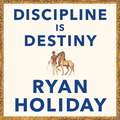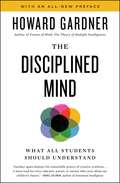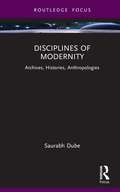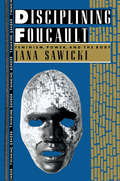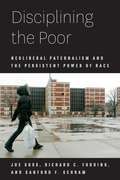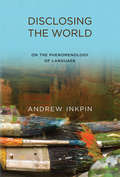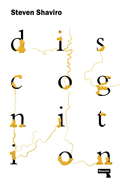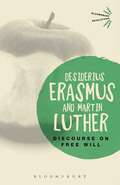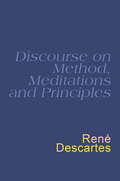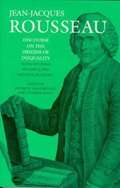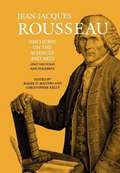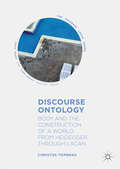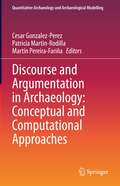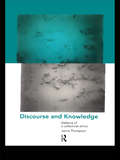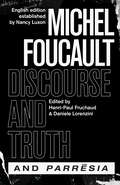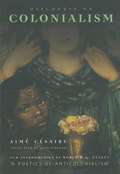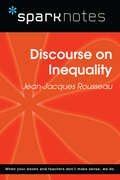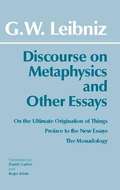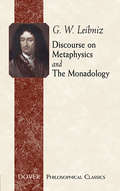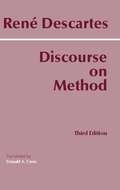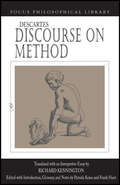- Table View
- List View
Discipline is Destiny: The Power of Self-Control
by Ryan HolidayAn inspiring anthem to the power, promise and challenges of self-control, the second in a series examining the timeless Stoic virtues from #1 New York Times bestselling author Ryan HolidayThe inscription on the Oracle of Delphi says: 'Nothing in excess.' C.S. Lewis described temperance as going to the 'right length but no further.' Easy to say, hard to practice - and if it was tough in 300 BCE, or in the 1940s, it feels all but impossible today. Yet it's the most empowering and important virtue any of us can learn.Drawing on ancient Stoic wisdom and examples across history and around the world, Ryan Holiday shows why self-control is so vital, and how to cultivate it in our own lives. Moderation is not about abstinence: it is about creativity, self-respect, focus and balance. Without it, even the most positive traits become vices. But with it, happiness and success are assured: it is the only way to live an extraordinary, fulfilled and effective life.
Disciplined Mind: What All Students Should Understand
by Howard GardnerThis brilliant and revolutionary theory of multiple intelligences reexamines the goals of education to support a more educated society for future generations.Howard Gardner&’s concept of multiple intelligences has been hailed as perhaps the most profound insight into education since the work of Jerome Bruner, Jean Piaget, and even John Dewey. Here, in The Disciplined Mind, Garner pulls together the threads of his previous works and looks beyond such issues as charters, vouchers, unions, and affirmative action in order to explore the larger questions of what constitutes an educated person and how this can be achieved for all students. Gardner eloquently argues that the purpose of K–12 education should be to enhance students&’ deep understanding of the truth (and falsity), beauty (and ugliness), and goodness (and evil) as defined by their various cultures. By exploring the theory of evolution, the music of Mozart, and the lessons of the Holocaust as a set of examples that illuminates the nature of truth, beauty, and morality, The Disciplined Mind envisions how younger generations will rise to the challenges of the future—while preserving the traditional goals of a &“humane&” education. Gardner&’s ultimate goal is the creation of an educated generation that understands the physical, biological, and societal world in their own personal context as well as in a broader world view. But even as Gardner persuasively argues the merits of his approach, he recognizes the difficulty of developing one universal, ideal form of education. In an effort to reconcile conflicting educational viewpoints, he proposes the creation of six different educational pathways that, when taken together, can satisfy people&’s concern for student learning and their widely divergent views about knowledge and understanding overall.
Disciplines of Modernity: Archives, Histories, Anthropologies (Routledge Focus on Modern Subjects)
by Saurabh DubeScrupulously based in anthropology and history – and drawing on social theory and critical thought – this book revisits the disciplines, archives, and subjects of modernity. There are at least three interleaving emphases here. To begin with, the work rethinks institutionalized formations of anthropology and history – together with "archives" at large – as themselves intimating disciplines of modernity. Understood in the widest senses of the terms, these disciplines are constitutively contradictory. Moreover, the study interrupts familiar projections of modern subjects as molded a priori by a disenchanted calculus of interest and reason. It tracks instead the affective, embodied, and immanent attributes of our varied worlds as formative of subjects of modernity, sown into their substance and spirit. Finally, running through the book is a querying of entitlement and privilege that underlie social terrains and their scholarly apprehensions – articulating at once distinct elites, pervasive plutocracies, and modern "scholasticisms."
Disciplining Foucault: Feminism, Power, and the Body (Thinking Gender)
by Jana SawickiIn this book, the author attempts to integrate previous work on Foucault with feminist theory. She expands discussion of feminism and sexual liberation, charts the impact of Foucault on humanistic studies, and picks up an aspect of the mothering theme, the question of new reproductive technologies.
Disciplining the Poor: Neoliberal Paternalism and the Persistent Power of Race (Chicago Studies in American Politics)
by Sanford F. Schram Joe Soss Richard C. FordingDisciplining the Poor explains the transformation of poverty governance over the past forty years—why it happened, how it works today, and how it affects people. In the process, it clarifies the central role of race in this transformation and develops a more precise account of how race shapes poverty governance in the post–civil rights era. Connecting welfare reform to other policy developments, the authors analyze diverse forms of data to explicate the racialized origins, operations, and consequences of a new mode of poverty governance that is simultaneously neoliberal—grounded in market principles—and paternalist—focused on telling the poor what is best for them. The study traces the process of rolling out the new regime from the federal level, to the state and county level, down to the differences in ways frontline case workers take disciplinary actions in individual cases. The result is a compelling account of how a neoliberal paternalist regime of poverty governance is disciplining the poor today.
Disclosing the World: On the Phenomenology of Language
by Andrew InkpinA phenomenological conception of language, drawing on Heidegger, Merleau-Ponty, and Wittgenstein, with implications for both the philosophy of language and current cognitive science.In this book, Andrew Inkpin considers the disclosive function of language—what language does in revealing or disclosing the world. His approach to this question is a phenomenological one, centering on the need to accord with the various experiences speakers can have of language. With this aim in mind, he develops a phenomenological conception of language with important implications for both the philosophy of language and recent work in the embodied-embedded-enactive-extended (4e) tradition of cognitive science. Inkpin draws extensively on the work of Martin Heidegger, Maurice Merleau-Ponty, and Ludwig Wittgenstein, showing how their respective conceptions of language can be combined to complement each other within a unified view. From the early Heidegger, Inkpin extracts a basic framework for a phenomenological conception of language, comprising both a general picture of the role of language and a specific model of the function of words. Merleau-Ponty's views are used to explicate the generic “pointing out”—or presentational—function of linguistic signs in more detail, while the late Wittgenstein is interpreted as providing versatile means to describe their many pragmatic uses. Having developed this unified phenomenological view, Inkpin explores its broader significance. He argues that it goes beyond the conventional realism/idealism opposition, that it challenges standard assumptions in mainstream post-Fregean philosophy of language, and that it makes a significant contribution not only to the philosophical understanding of language but also to 4e cognitive science.
Discognition
by Steven ShaviroWhat is consciousness? What is it like to feel pain, or to see the color red? Do robots and computers really think? For that matter, do plants and amoebas think? If we ever meet intelligent aliens, will we be able to understand what they say to us? Philosophers and scientists are still unable to answer questions like these. Perhaps science fiction can help. In Discognition, Steven Shaviro looks at science fiction novels and stories that explore the extreme possibilities of human and alien sentience.From the Trade Paperback edition.
Discontinuity in Learning
by Andrea R. EnglishIn this groundbreaking book, Andrea English challenges common assumptions by arguing that discontinuous experiences, such as uncertainty and struggle, are essential to the learning process. To make this argument, Dr. English draws from the works of two seminal thinkers in philosophy of education - nineteenth-century German philosopher J. F. Herbart and American Pragmatist John Dewey. English's analysis considers Herbart's influence on Dewey, inverting the accepted interpretation of Dewey's thought as a dramatic break from modern European understandings of education. Three key concepts-- transformational learning, tact in teaching, and perfectibility-- emerge from this analysis to revitalize our understanding of education as a transformational process. Dr. English's comparative approach interweaves European and Anglo-American traditions of educational thought with a contemporary scholarly perspective, contributing to a work that is both intellectually rewarding and applicable to a classroom setting. The result is a book that is essential reading for philosophers and scholars of education, as well as educators.
Discourse On Free Will (Bloomsbury Revelations Ser.)
by Desiderius ErasmusDesiderius Eramsus (1466/9-1536) was the most renowned scholar of his age, a celebrated humanist and Classicist, and the first teacher of Greek at Cambridge. An influential figure in the Protestant Reformation, though without ever breaking from the Church himself, he satirised both human folly and the corruption of the Church. Martin Luther (1483-1546) was the founder of the German Reformation. His 95 Theses became a manifesto for reform of the Catholic Church and led to his being tried for heresy. He remained in Germany, Professor of Biblical Exegesis at the University of Wittenburg, until his death, publishing a large number of works, including three major treatises and a translation of the New Testament into German. Comprising Erasmus's "The Free Will" and Luther's "The Bondage of the Will", Discourse on Free Will is a landmark text in the history of Protestantism. Encapsulating the perspective on free will of two of the most important figures in the history of Christianity, it remains to this day a powerful, thought-provoking and timely work.
Discourse On Method and Related Writings
by René Descartes Desmond M. ClarkeDescartes' Discourse on Methodhas long been regarded as a seminal contribution to modern philosophy. We can now see that it is also one of the key texts in the 'scientific revolution' of the seventeenth century. Rene Descartes (1596-1650) did major research in optics, geometry, astronomy and physiology, although he published nothing until he was over forty. The Discourseforms the preface to his first collection of scientific papers (1637), sketching in a new method based on hypothesis and deduction which was soon to replace traditional techniques derived from Aristotle. This edition puts the work in context, by including extracts from Descartes' correspondence, the Rules for Guiding One's Intelligenceand from The World- a posthumously published summary of his physical theories. The age of Newton marks one of the great turning points in intellectual history; Descartes has a key place at its very heart. Also by Descartes is the companion volume, Meditations and other Metaphysical Writings.
Discourse On Method, Meditations And Principles: Descartes : Discourse On Method
by Rene DescartesWith the celebrated words 'I think therefore I am', Descartes' compelling argument swept aside ancient and medieval traditions. He deduced that human beings consist of minds and bodies; that these are totally distinct 'substances'; that God exists and that He ensures we can trust the evidence of our senses.Ushering in the 'scientific revolution' of Galileo and Newton, Descartes' ideas have also set the agenda for debate ever since.By calling everything into doubt, Descartes laid the foundations of modern philosophy.
Discourse On Method: Meditations on the First Philosophy: Principles of Philosophy
by Rene Descartes John VeitchWith the celebrated words 'I think therefore I am', Descartes' compelling argument swept aside ancient and medieval traditions. <P><P>He deduced that human beings consist of minds and bodies; that these are totally distinct 'substances'; that God exists and that He ensures we can trust the evidence of our senses. Ushering in the 'scientific revolution' of Galileo and Newton, Descartes' ideas have also set the agenda for debate ever since. <P>By calling everything into doubt, Descartes laid the foundations of modern philosophy.
Discourse On The Origin Of Inequality, Polemics, And Political Economy
by Jean-Jacques Rousseau Judith R. Bush Terence Marshall Christopher Kelly Roger D. MastersIncludes the Second Discourse (complete with the author’s extensive notes), contemporary critiques by Voltaire, Diderot, Bonnet, and LeRoy, Rousseau’s replies (some never before translated), and Political Economy, which first outlined principles that were to become famous in the Social Contract. This is the first time that the works of 1755 and 1756 have been combined with careful commentary to show the coherence of Rousseau’s “political system. ” The Second Discourse examines man in the true “state of nature,” prior to the formation of the first human societies, tracing the “hypothetical history” of political society and social inequality as they developed out of natural equality and independence.
Discourse On The Sciences And Arts And Polemics: Volume 2 of the Collected Writings of Rousseau
by Jean-Jacques Rousseau Christopher Kelly Judith R. Bush Roger D. MastersContains the entire First Discourse, contemporary attacks on it, Rousseau’s replies to his critics, and his summary of the debate in his preface to Narcissus. A number of these texts have never before been available in English. The First Discourse and Polemics demonstrate the continued relevance of Rousseau’s thought. Whereas his critics argue for correction of the excesses and corruptions of knowledge and the sciences as sufficient, Rousseau attacks the social and political effects of the dominant forms of scientific knowledge.
Discourse Ontology: Body and the Construction of a World, from Heidegger through Lacan (The Palgrave Lacan Series)
by Christos TombrasThis book explores the themes within, and limits of, a dialogue between Martin Heidegger’s philosophy of being and Jacques Lacan’s post-Freudian metapsychology. It argues that a conceptual bridging between the two is possible, and lays the foundations of that bridge, starting with Heidegger and proceeding through the work of Lacan. After presenting basic aspects of Heidegger’s ontology, Tombras focuses on his incisive critique of modern science and psychoanalysis, and argues that psychoanalytic theory is vulnerable to this critique. The response comes from Lacan’s re-reading and recasting of fundamental Freudian insights, and his robust post-Freudian metapsychology. A broad discussion of Lacan’s work follows, to reveal its rupture with traditional philosophy, and show how it builds on and then reaches beyond Heidegger’s critique. This book is informed by the terminology, insights, concepts, hypotheses, and conclusions of both thinkers. It discusses time and the body in jouissance; the emergence of the divided subject and signifierness; truth, agency and the event; and being and mathematical formalisation. Tombras describes the ontological recursive construction of a shared ontic world and discusses the limits and historicity of this world.
Discourse Ontology: Body and the Construction of a World, from Heidegger through Lacan (The Palgrave Lacan Series)
by Christos TombrasThis book explores the themes within, and limits of, a dialogue between Martin Heidegger’s philosophy of being and Jacques Lacan’s post-Freudian metapsychology. It argues that a conceptual bridging between the two is possible, and lays the foundations of that bridge, starting with Heidegger and proceeding through the work of Lacan. After presenting basic aspects of Heidegger’s ontology, Tombras focuses on his incisive critique of modern science and psychoanalysis, and argues that psychoanalytic theory is vulnerable to this critique. The response comes from Lacan’s re-reading and recasting of fundamental Freudian insights, and his robust post-Freudian metapsychology. A broad discussion of Lacan’s work follows, to reveal its rupture with traditional philosophy, and show how it builds on and then reaches beyond Heidegger’s critique. This book is informed by the terminology, insights, concepts, hypotheses, and conclusions of both thinkers. It discusses time and the body in jouissance; the emergence of the divided subject and signifierness; truth, agency and the event; and being and mathematical formalisation. Tombras describes the ontological recursive construction of a shared ontic world and discusses the limits and historicity of this world.
Discourse and Argumentation in Archaeology: Conceptual and Computational Approaches (Quantitative Archaeology and Archaeological Modelling)
by Patricia Martin-Rodilla Cesar Gonzalez-Perez Martín Pereira-FariñaThis book covers the topic of discourse and argumentation in archaeology with an aim to serve the archaeology community. The book presents discourse and argument analysis approaches and techniques in an affordable manner and applied to archaeological situations. It focuses on techniques and approaches that can be applicable to multiple situations, periods and cultures. The book begins with an introduction to discourse and argumentation analysis as a general field and also as an auxiliary technique to archaeology. The work includes conceptual applications, ranging from causality, ontological connections, vagueness, social production of discourse and public debates. The work also devotes a section to computational approaches and describes the specifics of some well-known families of algorithms such as lexical processing, information extraction or sentiment analysis. The conclusion comments on the future and which reflects on the previous chapters and discusses how the presented techniques and approaches should be adapted or improved for easier and more powerful application to archaeology. Contributing authors bring perspectives from archaeology, linguistics, and computer science.
Discourse and Knowledge: Defence of a Collectivist Ethics
by Janna ThompsonEthical disagreement is a fact of social life. We disagree about issues such as abortion, euthanasia, the meaning of justice and the treatment of animals, and our debates often fail to reach a consensus. Some philosophers think that this means there is no objective knowledge about morality. Discourse and Knowledge takes a radically different approach to the defence of ethical rationality. It claims that there is a correct solution to ethical controversies, but that ethical decisions have to be made collectively. Written specifically for those studying or teaching ethics or moral theory,Discourse and Knowledge will also be ideal for those on courses on social theory, ethics or feminist philosophy.
Discourse and Truth and Parresia (The Chicago Foucault Project)
by Michel Foucault“An invaluable book” of late-career lectures that reveal Foucault’s perspective on truth, truth-telling, and the nature of discourse (Choice).This volume collects a series of lectures given by the renowned French thinker Michel Foucault. The first part presents a talk, Parresia, delivered at the University of Grenoble in 1982. The second presents a series of lectures entitled “Discourse and Truth,” given at the University of California, Berkeley in 1983, which appears here for the first time in its full and correct form. Together, these lectures provide an unprecedented account of Foucault’s reading of the Greek concept of parresia, often translated as “truth-telling” or “frank speech.” The lectures trace the transformation of this concept across Greek, Roman, and early Christian thought, from its origins in pre-Socratic Greece to its role as a central element of the relationship between teacher and student. In mapping the concept’s history, Foucault’s concern is not to advocate for free speech; rather, his aim is to explore the moral and political position one must occupy in order to take the risk to speak truthfully.These lectures—carefully edited and including notes and introductory material to fully illuminate Foucault’s insights—are a major addition to Foucault’s English language corpus.
Discourse on Colonialism
by Robin D. G. Kelley Aime Cesaire Joan Pinkham Rene DepestreThis classic work, first published in France in 1955, profoundly influenced the generation of scholars and activists at the forefront of liberation struggles in Africa, Latin America, and the Caribbean. Nearly twenty years later, when published for the first time in English, Discourse on Colonialism inspired a new generation engaged in the Civil Rights, Black Power, and anti-war movements and has sold more than 75,000 copies to date.
Discourse on Inequality (SparkNotes Philosophy Guide)
by SparkNotesDiscourse on Inequality (SparkNotes Philosophy Guide) Making the reading experience fun! SparkNotes Philosophy Guides are one-stop guides to the great works of philosophy–masterpieces that stand at the foundations of Western thought. Inside each Philosophy Guide you&’ll find insightful overviews of great philosophical works of the Western world.
Discourse on Metaphysics and Other Essays
by Roger Ariew Gottfried Wilhelm Leibniz Daniel GarberDiscourse on Metaphysics and Other Essays contains complete translations of the two essays that constitute the best introduction to Leibniz's complete thought: 'Discourse on Metaphysics', a short course in his metaphysics, written in 1686 at the time his mature thought was just crystalising and 'Monadology' of 1714, a summary of Leibniz's mature metaphysics, written late in his long career. These are supplemented with two essays of special interest to the student of modern philosophy, 'On the Ultimate Origination of Things' of 1697, which deals clearly with Leibniz's celebrated doctrine of contingency and creation, and the Preface to his New Essays of 1703-1705, which presents a brief and coherent overview of his epistemological position, particularly as it relates to the empiricism of Locke.
Discourse on Metaphysics and The Monadology
by G. W. Leibniz Albert R. Chandler George R. MontgomeryOne of the seventeenth century's most important thinkers, Gottfried Wilhelm Leibniz exercised enormous influence on the philosophy of Herder, Feuerbach, and Hegel as well as on the writings of Schiller and Goethe. Two of Leibniz's most studied and often quoted works appear in this volume: Discourse on Metaphysics and The Monadology.Published in 1686, the Discourse on Metaphysics consists of Leibniz's expansion of a letter to his theologian friend Antoine Arnauld, in which he explains that through our perceptions we express the rest of the universe from our own unique perspectives. The whole world is thus contained in each individual substance as each represents the same universe and "the universe is in a way multiplied as many times as there are substances, and similarly the glory of God is redoubled by as many completely different representations of His work." It is here that Leibniz makes his famous assertion that God, with perfect knowledge and goodness, freely chose to create this, the best of all possible worlds.The Monadology, written in 1714, offers a concise synopsis of Leibniz's philosophy. It establishes the laws of final causes, which underlie God's free choice to create the best possible world--a world that serves as dynamic and perfectly ordered evidence of the wisdom, power, and benevolence of its creator.
Discourse on Method
by Donald A. Cress Rene DescartesBy far the most widely used translation in North American college classrooms, Donald A. Cress's translation from the French of the Adam and Tannery critical edition is prized for its accuracy, elegance, and economy. The translation featured in the Third Edition has been thoroughly revised from the 1979 First Edition and includes page references to the critical edition for ease of comparison.
Discourse on Method
by René Descartes Frank Hunt Richard Kennington Pamela KrausThis is an English translation of Descartes' seminal discourse, with an original essay by Richard Kennington. This text is designed to provide the student with a close translation, notes, and a glossary of key terms, facilitating access to ideas as they originally were presented and helping to make the translator's work transparent.Focus Philosophical Library translations are close to and are non-interpretative of the original text, with the notes and a glossary intending to provide the reader with some sense of the terms and the concepts as they were understood by Decartes' immediate audience.The Focus Philosophical Library publishes clear, faithful editions enabling access for modern students to the essential ideas and wisdom of the world's greatest thinkers.
